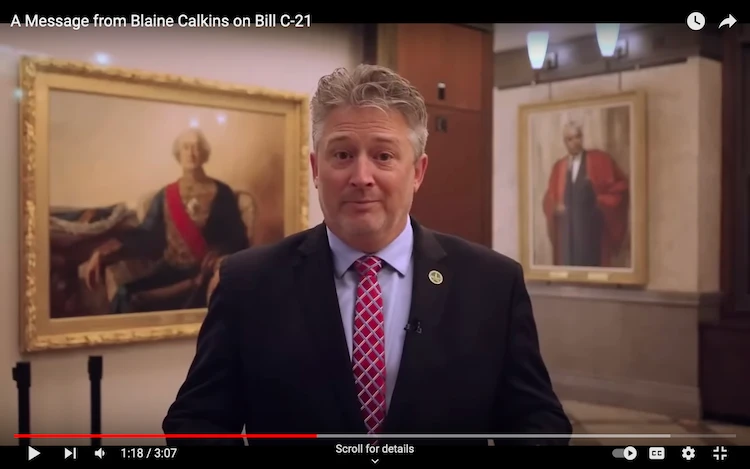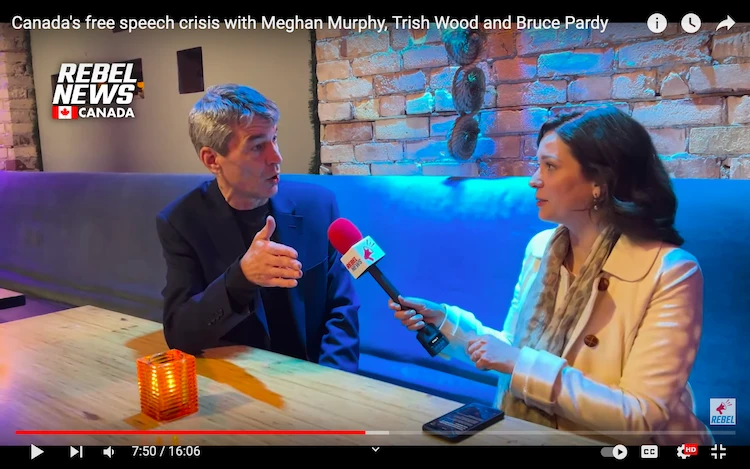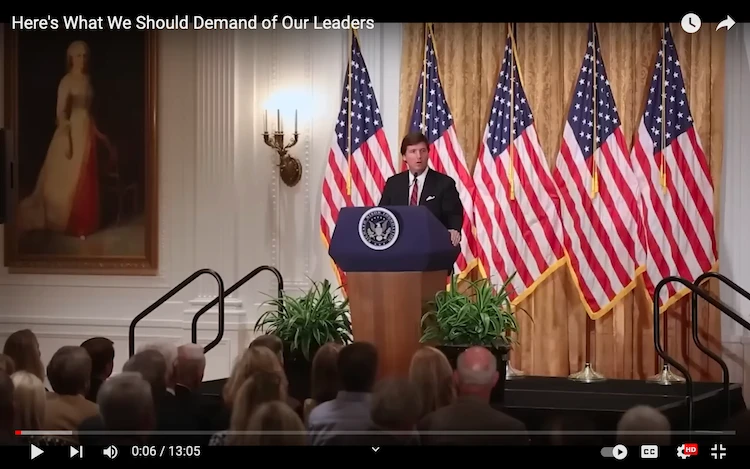Video: A Message from Blaine Calkins on Bill C-21
YouTube Link: https://youtu.be/AJrCzeQNGps?si=lS2KuFqbTge316EZ @skillsgaptrain “As a group of immigrants who made Canada our home in 1990, our journey has been defined by a profound and enduring admiration for the cultures of America and Canada. After travelling through Europe, the Middle East, and Asia, we found these North American nations to be unparalleled in their cultural richness. Our passion for their history, philosophy, psychology, technology, business practices, and cultural icons – from Chuck Norris and Clint Eastwood to Jean Luc Picard, Lucas Botkin, Canadian Prepper, Steve Jobs, Jordan Peterson, and innovations like Quad Core Intel chips, Google, and Ford F-150 Super Heavy Duty – has been a cornerstone of our experience. Yet, this journey has presented unexpected challenges. In our pursuit of the rich cultural heritage of America and Canada, we continually encountered forces that seemed to divert us from fully appreciating and embracing these cultures:
Committees and Government Policies: Our observations revealed a trend in policy-making that focused primarily on accommodating the identities of newcomers, often neglecting to reinforce the core identities and economic sustainability and growth of local populations, local millenials and Gen Z. These policies frequently favoured immigration from cultures significantly different and less inclined to integrate or adopt Canadian or American values. Conversely, a deep appreciation for the foundational elements of America or Canada 🇨🇦 – principles such as self-defence, the sanctity of home, property rights, personal rights, firearm rights, freedom, patriotism, military service, respect for parliament, law, and allegiance to the Queen or the Constitution – did not seem a priority for either new arrivals or the immigration system planners and their political leadership teams. This approach often missed the opportunity to foster mutual understanding and respect for the fundamental values that define Canadian and American life.
Educational System: We encountered a reluctance within some educational institutions to delve into the full breadth of Canadian and American subjects. Topics like Christianity, American philosophers, history, free markets, entrepreneurship, public safety, firearms education, European firearm history, history of conflicts other than WW2, sports shooting, hunting, conservation, emergency preparedness/pioneering, marksmanship, constitutional law, privacy, sovereignty, domestic security, militias, rangers, national security, freedom, free-speech and patriotism were often overlooked, along with a general avoidance of discussing the European-influenced system of law and philosophy.
Social Circles and Community Influences: In our social interactions, there was a noticeable trend away from iconic American and Canadian cultural elements. Narratives often shied away from patriotism, loyalty to the public or the country, and discussions about our British/European-influenced legal and philosophical systems. Politicians and community leaders sometimes trivialized adopting American or European ideas, which struck us as odd for a society deeply rooted in these traditions.
Media and Online Platforms: Traditional content, especially that with cultural or historical depth, pragmatic perspectives, or academic origins, professors from universities or premium private educators/ trainers, seemed suppressed in favour of infotainment or entertainment, lacking cultural significance or actual real world relevancy. These reflections stem from our concerns about recent discourse surrounding firearms, such as Bill C-21 and the May 2020 OIC. To us, Canadian and American rifles, like semi-automatics used by sports shooters, hunters, collectors, and enthusiasts, are not just tools. They represent crucial aspects of North American culture – symbols of liberty, self-reliance, defence, military, law, public safety, philosophy, freedom, and our connection to American, Canadian, and European history. The push to ban these firearms appears as a direct cut from our cultural roots and echoes similar trends we’ve observed in government, education, social circles, and other areas of society. This movement reflects a broader shift towards a mentality of defencelessness and a fading loyalty to the historical and cultural values of Canada and America. Our worry is that this distancing from our cultural roots may lead to a future where the essence of Canadian and American identity becomes diluted or lost. We believe it is vital for future leaders to understand and value the historical and cultural foundations of these nations to prevent the fading of this rich culture. We hope that future immigrants will have the chance to fully engage with and appreciate the true spirit of North America. We desire a government that not only takes pride in our society but also seeks immigrants who aspire to continue on the path set by this society, rather than attempting to rebuild the societies they left. We advocate for policies that foster growth and unity, not just in immigration but across all facets of society, encouraging us to grow together rather than shrink and reinvent. The ongoing cultural shifts, including changes in firearm rights, are a clear signal of a broader disconnection from foundational values. This is a call to action for leaders to rekindle respect and commitment to the principles that have long defined the Canadian and American way of life. As immigrants who came here with admiration and respect for this culture, we believe it’s crucial to maintain its integrity for future generations to experience and cherish. Embracing Canadian and American ideas, their people, and their history should not be seen as an obligation, but as an opportunity to be part of a legacy that deserves to be protected and celebrated. Canadians and Americans don’t need to change to meet new expectations; they should be appreciated for the rich cultural heritage they already offer.”
Related Content:
Video: Canada’s free speech crisis with Meghan Murphy, Trish Wood and Bruce Pardy
Link: https://www.youtube.com/watch?v=bq_5s-GKdt8
Video: Here’s What We Should Demand of Our Leaders
Link: https://youtu.be/WCaxWeNMbh8?si=fVsEqPxtfzJbNewc
@sebanapo3858 “This guy is an absolute blessing from heaven!! The Lord is moving him to the front!!! For His purpose!!” @ItchyTrigahFinger “Please run for president in 4 years!” @skillsgaptrainer “Thinking about Tucker Carlson expanding his presence on YouTube and Twitter for the next 4-5 years is exciting and a good idea. Just imagine the wealth of knowledge and insight he could bring to these platforms! His contributions could become a treasure trove for preserving and understanding American history, its essence and its real problems. More than that, his unique perspective could lay a solid philosophical foundation to tackle future challenges and address problematic concepts he reveals or problematic government leaders or problematic banking leaders. While YouTube has its fair share of authentic, sincere, and pragmatic voices like Tucker, what sets him apart is his ability to navigate complex spheres or levels within society, to operate at all levels. Unlike many influencers and experts who are vulnerable to being managed, demoted, or even cancelled, Tucker has this incredible knack for getting past barriers that others can’t. He’s speaks to both establishment figures and the everyday person, making his voice crucial and hard to ignore and hard to covertly or secretly suppress. As for the big question of him running for president or vice president, whether in 2024 or later, it’s tricky to pinpoint the perfect timing. It’s a decision that seems to rest not just with him but with the people. They’re the ones who’ll sense when the time is right for someone like Tucker to step up to such a monumental challenge. Hopefully, when that time comes, it won’t mean sacrificing his unique talents in media reporting. The work he does there is invaluable, because he is creating non-establishment content that is not like the content that is made nowadays, which usually has billions of dollars behind it like in Canada. By making content that is from his own desire and his own investigation, he is basically like all the other Millenial or Gen Z influencers but able to operate to counter the voice of thousands of corporations and government sponsored and investor sponsored media outlet networks. We need his voice, his insights, and the way he challenges us to think deeper about our country and its future. This makes Tucker Carlson a type of defender of last resort, when it comes to the media industry, similar to how they say for central banks. Lender of Last Resort.”
Related books and resources:
“Empire of the Summer Moon” by S.C. Gwynne: Chronicles the rise and fall of the Comanche tribe and the making of the American West.
“Walden” by Henry David Thoreau: Reflects on simple living in natural surroundings, emphasizing personal independence and self-reliance.
“American Sniper” by Chris Kyle: The autobiography of a U.S. Navy SEAL, discussing duty, patriotism, and American military culture.
“Into the Wild” by Jon Krakauer: Explores the allure of wilderness and the American spirit of adventure.
“The Federalist Papers” by Alexander Hamilton, James Madison, and John Jay: A collection of essays promoting the ratification of the United States Constitution.
“Self-Reliance and Other Essays” by Ralph Waldo Emerson: Centers on the ideals of individualism and personal philosophy.
“Bowling Alone” by Robert D. Putnam: Analyzes the decline of social capital and community in American life. “On the Road” by Jack Kerouac: Iconic novel representing freedom, the search for meaning, and the quintessential American road trip.
“Guns, Germs, and Steel” by Jared Diamond: Though not exclusively about America, it provides context for the development of societies, including the factors that influenced the rise of the United States.
“The Right Stuff” by Tom Wolfe: Chronicles the early days of the U.S. space program and the cultural ethos of the American pilots who became astronauts.
“Anne of Green Gables” by L.M. Montgomery: Iconic novel reflecting Canadian identity through life in Prince Edward Island.
“Three Day Road” by Joseph Boyden: A novel about two Cree soldiers from northern Ontario during WWI. “Souvenir of Canada” by Douglas Coupland: Reflects on Canadian pop culture and the symbols of national identity.
“Life of Pi” by Yann Martel: While not exclusively about Canada, this novel reflects on survival, faith, and multiculturalism from the perspective of a Canadian immigrant.
“The Juggler’s Children: A Journey into Family, Legend and the Genes that Bind Us” by Carolyn Abraham: Explores Canadian family histories and multicultural roots.
“Why I Hate Canadians” by Will Ferguson: A humorous yet insightful examination of Canadian national identity and stereotypes.
“Shake Hands with the Devil” by Romeo Dallaire: While detailing experiences in Rwanda, this book offers insight into the values and challenges of a Canadian peacekeeper.
“The Culture Map” by Erin Meyer: Offers insights into how different cultures communicate, perceive, and make decisions. It’s useful for understanding cultural differences between immigrants and North American societies.
“Outliers: The Story of Success” by Malcolm Gladwell: Examines factors that contribute to high levels of success, including cultural background, which might offer perspectives on integrating and valuing diverse cultures in Canada and the US.
“Strangers to These Shores” by Vincent N. Parrillo: Explores the challenges and contributions of various immigrant groups in America, providing context to the immigrant experience in North American culture.
“Who Are We? The Challenges to America’s National Identity” by Samuel P. Huntington: Discusses the impact of immigration on American identity, relevant to discussions on preserving cultural heritage.
“American Nations: A History of the Eleven Rival Regional Cultures of North America” by Colin Woodard: Explains the cultural history of North America in a way that immigrants might understand the complex cultural landscape.
“The Canadian Identity” by David M. K. Sheinin: Offers an understanding of what constitutes Canadian identity, exploring themes of diversity and unity.
To see our Donate Page, click https://skillsgaptrainer.com/donate
To see our Instagram Channel, click https://www.instagram.com/skillsgaptrainer/
To see some of our Udemy Courses, click SGT Udemy Page
To see our YouTube Channel, click https://www.youtube.com/@skillsgaptrainer

